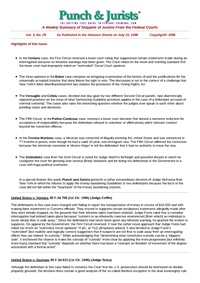Loaded on
July 1, 1996
published in Punch and Jurists
July 15, 1996
Here the Court held that, while there are no limitations on what factors a court may consider in deciding not to grant a Rule 35(b) sentence reduction, the only factor it may consider in granting such a motion is the defendant's substantial assistance.
In this case, the Court …
Loaded on
July 1, 1996
published in Punch and Jurists
July 15, 1996
Here the Court reversed Judge Fuste's grant of a suppression motion on the grounds that customs is an inherently coercive environment, stating that custody depends on whether the restraints are equivalent to a formal arrest.
The defendants in this case were charged with failing to report the transportation …
Loaded on
July 1, 1996
published in Punch and Jurists
July 15, 1996
United States v. Versaglio, 85 F.3d 943 (2nd Cir. 1996)
United States v. Cefalu, 85 F.3d 964 (2nd Cir. 1996)
Poor Judge Korman! Both of these cases involve sentences for criminal contempt under the Guidelines based on the defendants' refusal to testify. In both cases, Judge Korman expressed some …
Loaded on
July 1, 1996
published in Punch and Jurists
July 15, 1996
Here the Court held that where the jury was permitted to find honest-services mail fraud upon proof of violations of either the State gift statute or the gratuity statute, and apellate court could not determine which, the convictions must be vacated.
In 1994, a federal grand jury returned …
Loaded on
July 1, 1996
published in Punch and Jurists
July 15, 1996
Relying on the Supreme Court's decision in Kyles v. Whitley, 514 U.S. 419 (1995), the Court held that a showing of materiality does not require proving that dusclosure of the suppressed evidence would have resulted in the defendant's acquittal.
Here the Court held: "The issue is thus whether …
Loaded on
July 1, 1996
published in Punch and Jurists
July 15, 1996
Here the Court not only held that unpublished decisions are not regarded as binding precedent, it also ruled that such opinions cannot be cited or considered in any case in the absence of unusual circumstances.
Here the Court observed that: "Under our own internal rules, unpublished decisions are …
Loaded on
July 1, 1996
published in Punch and Jurists
July 15, 1996
This is a significant decision in which the Court held that the "Bartkus exception" (which holds that a successive prosecution by a sovereign that is acting as the pawn of another is a sham) is sound law and binding on the courts.
The Court stated: "We find the …
Loaded on
July 1, 1996
published in Punch and Jurists
July 15, 1996
The defendants in this case were charged with failing to report the transportation of money in excess of $10,000 and with making false statements to Customs officials. They moved to suppress certain inculpatory statements allegedly made after they were initially stopped, on the grounds that their Miranda rights had …
Loaded on
July 1, 1996
published in Punch and Jurists
July 15, 1996
The Government moved to reduce the defendant's sentence based on his substantial assistance after sentencing. Judge Fawsett granted a reduction of only seven months, even though the Government recommended a reduction of 60 months. The defendant appealed and argued that, in light of the Eleventh Circuit's holding in U.S. …
Loaded on
July 1, 1996
published in Punch and Jurists
July 15, 1996
In this case the Court addressed the use of evidence of cooperation in other cases to counter an attack on a witness' credibility. The witness involved in that case, one Tommy Burns, had testified in numerous other insurance fraud cases involving the killing of horses for insurance money. (See, …
Loaded on
July 1, 1996
published in Punch and Jurists
July 15, 1996
The Government appealed the sentence imposed on the defendant after his conviction for tampering with a witness in violation of 18 U.S.C. § 1512(b)(3). The applicable Guideline provision for that crime is U.S.S.G. § 2J1.2(a) which provides for a base offense level of 12, but which also contains a …
Loaded on
July 1, 1996
published in Punch and Jurists
July 15, 1996
This case is noted because of its reminder that "silence is golden" and because of its analysis of the development of the current Guideline provision dealing with acceptance of responsibility, namely U.S.S.G. § 3E1.1. The defendant pled guilty to transporting aliens within the United States. The Presentence Report (PSR) …
Loaded on
July 1, 1996
published in Punch and Jurists
July 15, 1996
Rejecting the Ninth Circuit's view in U.S. v. Kipp, 10 F.3d 1463, the 11th Circuit holds that drugs held for personal consumption are properly included as relevant conduct in determining the defendant's base offense level.
Loaded on
July 1, 1996
published in Punch and Jurists
July 15, 1996
The defendant in this case moved to withdraw his guilty plea on the grounds of (a) ineffective assistance of counsel, (b) lack of understanding of the plea agreement, and (c) his professed innocence. The Court noted that it has identified three "core" concerns of Rule 11: (1) absence of …
Loaded on
July 1, 1996
published in Punch and Jurists
July 15, 1996
United States v. Versaglio, 85 F.3d 943 (2nd Cir. 1996)
United States v. Cefalu, 85 F.3d 964 (2nd Cir. 1996)
Poor Judge Korman! Both of these cases involve sentences for criminal contempt under the Guidelines based on the defendants' refusal to testify. In both cases, Judge Korman expressed some …
Loaded on
July 1, 1996
published in Punch and Jurists
July 15, 1996
After the defendant was convicted of drug trafficking, he appealed arguing that the trial court had improperly (and over his Rule 404(b) objections) allowed the introduction of testimony from a witness about the defendant’s previous involvement in an unrelated crack transaction. Specifically he argued that in light of the …
